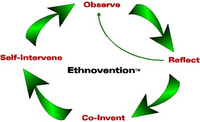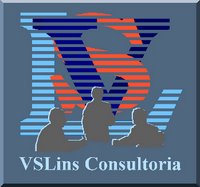Ethnovention
 EthnoventionTM is a term coined by Work Frontiers InternationalTM to describe our rapid, iterative method of studying the behavior of an organization or community using organizational ethnography and archaeology, and in the same cycle, introducing innovative interventions to enhance their behavior.
EthnoventionTM is a term coined by Work Frontiers InternationalTM to describe our rapid, iterative method of studying the behavior of an organization or community using organizational ethnography and archaeology, and in the same cycle, introducing innovative interventions to enhance their behavior. These quick EthnoventionTM cycles typically produce rapid improvements in the work practices of the community. This is because the community gains deep insights into their behaviors and is given the opportunity to reflect on them and change them themselves. This is much more effective than the traditional brute force method of change - being forced to implement changes designed by others without the participation or intimate knowledge of the affected community.
They also learn the new approach more quickly and deeply because they designed it and they get to keep experimenting with it until they find just the right fit for themselves.
An example of how this works is a recent knowledge audit conducted by Work Frontiers for a large non-profit organization. The desired outcomes of the knowledge audit were:
- Seek answers to the following questions:
- What knowledge do staff need to do their jobs?
- Where/whom do they get it from?
- How do they use it?
- What do they do with it when they’re finished?
- What enhances the flow & sharing of knowledge/information?
- What impedes it?
- Avoid rehashing & repeating the same old messages about what’s wrong with the organization
- Instead, focus on what works & what can realistically be done
- Seek to leverage the organization’s existing strengths & intellectual assets
Using EthnoventionTM , we sought to not only observe and record the knowledge behaviors of the organization staff. We also were there to influence them as soon and as much as possible, without inflating their expectations beyond the ability of the organization to meet them.
Two Work Frontiers ethnoventors spent about two and a half months interacting with most parts of the organization, studying its knowledge behaviors and artifacts. By immersing ourselves in the organization for this period, we were able to not only do objective data collection, but also to accumulate subjective impressions of the organization which helped us to understand the essence and root causes of the data rather than just the form of it.
A Powerful Tool for Organizational Reflection and Transformation
by Arian Ward, Wednesday, July 28, 1999


<< Home